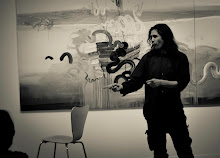There is an old truism, that one needs in thought to be very carful about emotions. Emotions lead one astray when one is thinking. They cloud thought, making you want to believe the untrue, or confuse the thought for the felt, as emotions form an intensity which feels like reality. This suspicion is well-founded; it was of such intense fears, and passions, that many a witch persecution is based. It is then no wonder that almost all philosophers, feeling themselves akin to witches, have lived in fear of the mob, and its collective passions: All the more so when the thinkers' ideas have often been untimely, problematic and complex. For how does one tell the collective believers they are not quite right, without becoming a figure of hate?
And yet this is only half the story. For what kind of passion motivates thinkers to think and act against the stream of public feeling? Is it really that they are following truth, pure and simple? And if so, is this not itself a passion? The answer surely is yes. What is more, it is a very singular passion, for it implies the thinker must have the courage to stand up against the mob, against what is currently 'normal' and thought right, a move which of course implies an even great passion for something, be it truth or posterity... To say that the philosopher should act dispassionately is therefore necessarily to miss the point. Most philosophers simply are passionate about something, - for why else write? What else is sustaining them as they sit in that closet, while the rain beats down and they think and write alone? Is it not that they are feeling the excitement of thinking and the urge to communicate those thoughts and the truths they open out on?
Moreover it is clear that passion that infuses their thought, in more diverse and complex ways, so much so that the relationship between the thinker and their passions is necessarily interesting in itself. For to think is of course to, in part, master one's passions, or perhaps better to endlessly reflect upon them. The result is essentially a patchwork of passion and thought. There are moments in every philosophy where the passion is not immediate, or hidden, or perhaps codified in the beauty or simple disruptiveness of an idea (think of Foucault's challenge to our ideas of sexuality here; a challenge that is passionate in the extreme, and yet expressed in logic). While at other times, the passion is allowed its head, in rhetorical flourishes or even sermons (think here of a Spinoza Scholium - little passionate essays that runs across his 'Ethics').
Finally many of the great philosophers are essentially vivisecting their own passions, and displaying the result. To read Spinoza's 'Ethics' or Nietzsche's 'Human all too Human', is to be taken close to the heart of a thinker, and their feelings. The power of the book lies in the way in which it allows you to understand the heart of its creator, and see in that heart echoes of one own being.
Philosophy is therefore caught is a very interesting and complex relationship with the feelings that infuse it, and yet which it must always clarify and reflect upon and through. A complex and often beautiful relationship, that is essentially the stuff of performance art. In showing the passion of thinkers, and how it infuses works of thought, one is both being true to the ideas of the thinker, but also their methodologies and motivations. For 'philosophy without passion is clearly a mistake'. What is more, these passions make great drama, and suck an audience of non-philosophers into a world some they thought they could never know, or perhaps otherwise experience: The world of thoughts and their passions, where philosophy really does mean 'love of knowledge'. A move that then allows the audience an entry point into philosophy, and new perhaps even offers them a new way to understand their own passions and their reaction to those passions.


Yes, you might say an idea is a way of converting emotion into thought. the very act of finding the words is the energy which produces the transformation. I think the neuroscientists tell us that it is impossible to do anything without emotion. We are always in some kind of emotional state, although we may not know it.
ReplyDelete